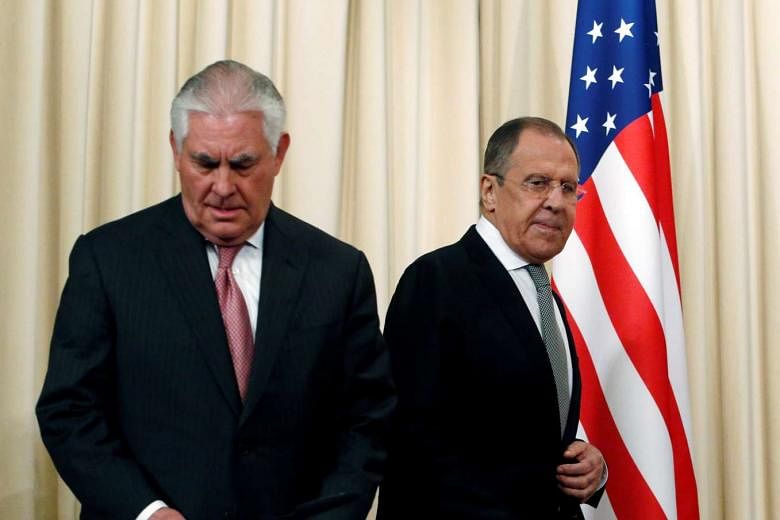MOSCOW (REUTERS) - Russian President Vladimir Putin said on Wednesday (April 12) that trust had eroded between the United States and Russia under President Donald Trump as Moscow delivered an unusually hostile reception to Secretary of State Rex Tillerson in a face-off over Syria.
Any hope in Russia that the Trump administration would herald less confrontational relations has been dashed in the past week after the new US leader fired missiles at Syria to punish Moscow's ally for its suspected use of poison gas.
Tillerson met Putin in the Kremlin after talking to his Russian opposite number Sergei Lavrov for around three hours. The Kremlin had previously declined to confirm Putin would meet Tillerson, reflecting tensions over the US strike on Syria.
As Tillerson sat down for talks with Lavrov earlier on Wednesday, a senior Russian official assailed the "primitiveness and loutishness" of US rhetoric, part of a volley of statements that appeared timed to maximise the awkwardness during the first visit by a member of Trump's Cabinet.
"One could say that the level of trust on a working level, especially on the military level, has not improved but has rather deteriorated," Putin said in an interview broadcast on Russian television.
He doubled down on Russia's support for Syrian President Bashar al-Assad, repeating denials that Assad's government was to blame for the gas attack last week and adding a new theory that the attack may have been faked by Assad's enemies.
Tillerson reiterated the US position that Assad must eventually relinquish power in Syria but appeared to take a slightly softer line with Russia.
"We discussed our view that Russia as their closest ally in the conflict perhaps has the best means of helping Assad recognise this reality," he said.
Lavrov had greeted Tillerson with unusually icy remarks, denouncing the missile strike on Syria as illegal and accusing Washington of behaving unpredictably.
One of Lavrov's deputies was even more undiplomatic. "In general, primitiveness and loutishness are very characteristic of the current rhetoric coming out of Washington," Deputy Foreign Minister Sergei Ryabkov told Russia's state-owned RIA news agency.
But Lavrov said some progress had been made on Syria at the meeting and that a working group would be set up to examine the poor state of US-Russia ties. He also said that Putin had agreed to reactivate a US-Russian air safety agreement over Syria which Moscow suspended after the US missile strikes.
Tillerson noted the low level of trust between the two countries. "The world's two foremost nuclear powers cannot have this kind of relationship," he said.
Moscow's hostility to Trump administration figures is a sharp change from last year, when Putin hailed Trump as a strong figure and Russian state television was consistently full of effusive praise for him.
COVER-UP
The White House has accused Moscow of trying to cover up Assad's use of chemical weapons after the attack on a town killed 87 people last week.
Trump responded to the gas attack by firing 59 cruise missiles at a Syrian air base on Friday. Washington warned Moscow, and Russian troops at the base were not hit.
Moscow has stood by Assad, saying the poison gas belonged to rebels, an explanation Washington dismisses as beyond credible. Putin said that either gas belonging to the rebels was released when it was hit by a Syrian strike on a rebel arms dump, or the rebels faked the incident to discredit Assad.
Trump came to the presidency promising to seek closer ties with Russia and greater cooperation fighting against their common enemy in Syria, Islamic State. Tillerson is a former oil executive who was awarded Russia's Order of Friendship by Putin.
Last week's poison gas attack and the US retaliation upended what many in Moscow hoped would be a transformation in relations between the two countries, which reached a post-Cold War low under Trump's predecessor Barack Obama.
The United States and its European allies imposed financial sanctions on Russia in 2014 after Putin seized territory from neighbouring Ukraine.
Washington is leading a campaign of air strikes in Syria against Islamic State fighters and has backed rebels fighting against Assad during a six-year civil war, but until last week the United States had avoided directly targeting the Syrian government.
Russia, meanwhile, intervened in the civil war on Assad's side in 2015 and has troops on the ground, which it says are advising government forces. Both Washington and Moscow say their main enemy is Islamic State in Iraq and Syria (ISIS), although they back opposing sides in the wider civil war which has killed more than 400,000 people and spawned the world's worst refugee crisis.
In an interview with the Fox Business Network, Trump said he was not planning to order US forces into Syria, but that he had to respond to the images of dead children poisoned in the gas attack.
"We're not going into Syria," he said in excerpts of the interview on the station's website. "But when I see people using horrible, horrible chemical weapons... and see these beautiful kids that are dead in their father's arms, or you see kids gasping for life... when you see that, I immediately called (Defence Secretary) General Mattis."
Tillerson travelled to Moscow with a joint message from Western powers that Russia should withdraw its support for Assad after a meeting of the Group of Seven industrialised economies also attended by Middle East allies.
Some of Washington's allies had been wary of Trump, who spoke during his election campaign of seeking closer ties with Moscow and questioned the value of US support for its traditional friends. Tillerson's mission sees the Trump administration taking on the traditional US role as spokesman for a unified Western position.
Trump's relations with Russia are also a domestic issue, as US intelligence agencies have accused Moscow of using computer hacking to intervene in the election to help Trump win. The FBI is investigating whether any Trump campaign figures colluded with Moscow, which the White House denies.

